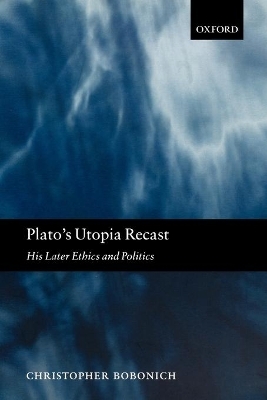
Plato's Utopia Recast
His Later Ethics and Politics
Seiten
2004
Oxford University Press (Verlag)
978-0-19-927410-9 (ISBN)
Oxford University Press (Verlag)
978-0-19-927410-9 (ISBN)
'Plato's Utopia Recast' reappraises Plato's later works, which reveals radical changes in his ethical and political theory. It examines later dialogues, with a special emphasis upon the 'Law', and argues that in these late works Plato both rethinks and revises the basic ethical and political positions that he held in his better known earlier works.
Plato's Utopia Recast is an illuminating reappraisal of Plato's later works, which reveals radical changes in his ethical and political theory.
Christopher Bobonich argues that in these works Plato both rethinks and revises important positions which he held in his better-known earlier works such as the Republic and the Phaedo. Bobonich analyses Plato's shift from a deeply pessimistic view of non-philosophers in the Republic, where he held that only philosophers were capable of virtue and happiness, to his far more optimistic position in the Laws, where he holds that the constitution and laws of his ideal city of Magnesia would allow all citizens to achieve a truly good life. Bobonich sheds light on how this and other highly significant changes in Plato's views are grounded in changes in his psychology and epistemology.
This book will change our understanding of Plato. His controversial moral and political theory, so influential in Western thought, will henceforth be seen in a new light.
Plato's Utopia Recast is an illuminating reappraisal of Plato's later works, which reveals radical changes in his ethical and political theory.
Christopher Bobonich argues that in these works Plato both rethinks and revises important positions which he held in his better-known earlier works such as the Republic and the Phaedo. Bobonich analyses Plato's shift from a deeply pessimistic view of non-philosophers in the Republic, where he held that only philosophers were capable of virtue and happiness, to his far more optimistic position in the Laws, where he holds that the constitution and laws of his ideal city of Magnesia would allow all citizens to achieve a truly good life. Bobonich sheds light on how this and other highly significant changes in Plato's views are grounded in changes in his psychology and epistemology.
This book will change our understanding of Plato. His controversial moral and political theory, so influential in Western thought, will henceforth be seen in a new light.
1. Philosophers and non-philosophers in the Phaedo and Republic ; 2. Virtue , good, and happiness in the Laws ; 3. Parts of the soul and the psychology of virtue ; 4. Parts of the soul and non-rational motivations ; 5. The Citizens of Magnesia ; References, Index
| Erscheint lt. Verlag | 22.7.2004 |
|---|---|
| Verlagsort | Oxford |
| Sprache | englisch |
| Maße | 156 x 234 mm |
| Gewicht | 895 g |
| Themenwelt | Geisteswissenschaften ► Philosophie ► Ethik |
| Geisteswissenschaften ► Philosophie ► Philosophie Altertum / Antike | |
| Sozialwissenschaften ► Politik / Verwaltung ► Politische Theorie | |
| ISBN-10 | 0-19-927410-X / 019927410X |
| ISBN-13 | 978-0-19-927410-9 / 9780199274109 |
| Zustand | Neuware |
| Informationen gemäß Produktsicherheitsverordnung (GPSR) | |
| Haben Sie eine Frage zum Produkt? |
Mehr entdecken
aus dem Bereich
aus dem Bereich
Buch | Hardcover (2025)
Suhrkamp (Verlag)
23,00 €


